As European destinations face increasing challenges with overtourism, some cities have seen anti-tourist protests against the influx of tourists in 2024. This has been particularly evident in hotspots like Spain, Venice, Amsterdam, and Greece. With these issues in mind, you might be wondering how to travel to Europe responsibly. By making a few mindful choices, you can have a more enjoyable experience while respecting local communities and preserving the beauty of these iconic destinations. Here are seven tips for responsible travel in Europe this year.
This post may contain affiliate links. If you make a purchase through these links, we will earn a small commission at no additional cost to you. We recommend products we have personally used or verified. Read the full disclosure here.
If you don’t have time to read this now, pin it for later!
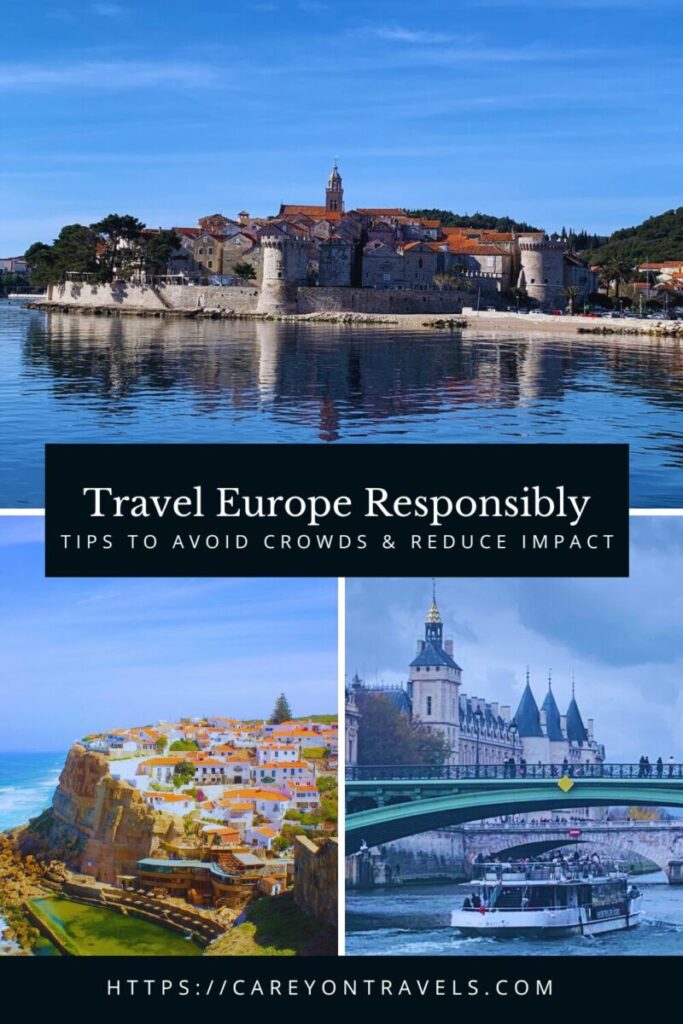
Why are There Anti-Tourist Protests in Europe in 2024?
In order to address how to travel to Europe in a way that has the least negative impact on the local communities, it is important to understand what is behind the anti-tourist protests. The Harvard International Review recently published an article on “The Misunderstood Rise of Anti-Tourism in Europe” (September 09, 2024). As they summarize, “The overarching reasons behind the protests are similar across Europe: inaccessible housing, excessive pollution, scarce essential services and resources, and a general lack of adequate infrastructure.”
As you consider your travel to Europe responsibly, consider these tips, which are intended to help you reduce your impact on your European destination’s housing, pollution, services, and infrastructure.
1. Responsible European Travel in the Shoulder or Off-Seasons
One of the top ways to minimize your impact on popular destinations is by visiting during the shoulder or off-seasons. Not only will you dodge the worst of the crowds, but you’ll also help balance the flow of tourism throughout the year, easing the pressure on local resources.
As an added benefit, traveling outside the peak summer months often means better deals, more personalized experiences, and a more relaxed atmosphere. Some of our favorite times to travel in Europe are April-May and September-November. Though the days get a bit shorter, the weather is often lovely for land-based explorations, and in some cases, even swimming. Do your research as some destinations get progressively more rainy (or snowy), while others retain their sunny days much longer. Winter shouldn’t be overlooked either. We’ve enjoyed wonderful winter visits to holiday markets in places like Heidelberg and Lisbon, ski trips in the alps, and warm weather escapes including Tenerife and Madeira. For more inspiration, check out the Top Places to Visit in Europe in November.

2. Explore Alternatives to the Most Popular Destinations
Instead of flocking to Europe’s most crowded tourist hubs during the high and shoulder seasons, consider exploring alternative destinations that offer similar experiences without the overwhelming crowds. For example, swap Barcelona for Valencia, Girona, or Alicante—charming cities that offer rich history, beautiful architecture, and vibrant cultures without the throngs of tourists. Rather than Venice, try Chioggia or head to Palermo, Sicily’s captivating capital. Instead of Dubrovnik, consider the lesser-known but equally beautiful island of Korčula or Kotor, Montenegro. Choose Porto or Coimbra over Lisbon, or the Alentejo over the Algarve, for a more tranquil Portuguese experience. By seeking out these alternatives, you’ll discover new favorites and help reduce the strain on over-touristed cities.
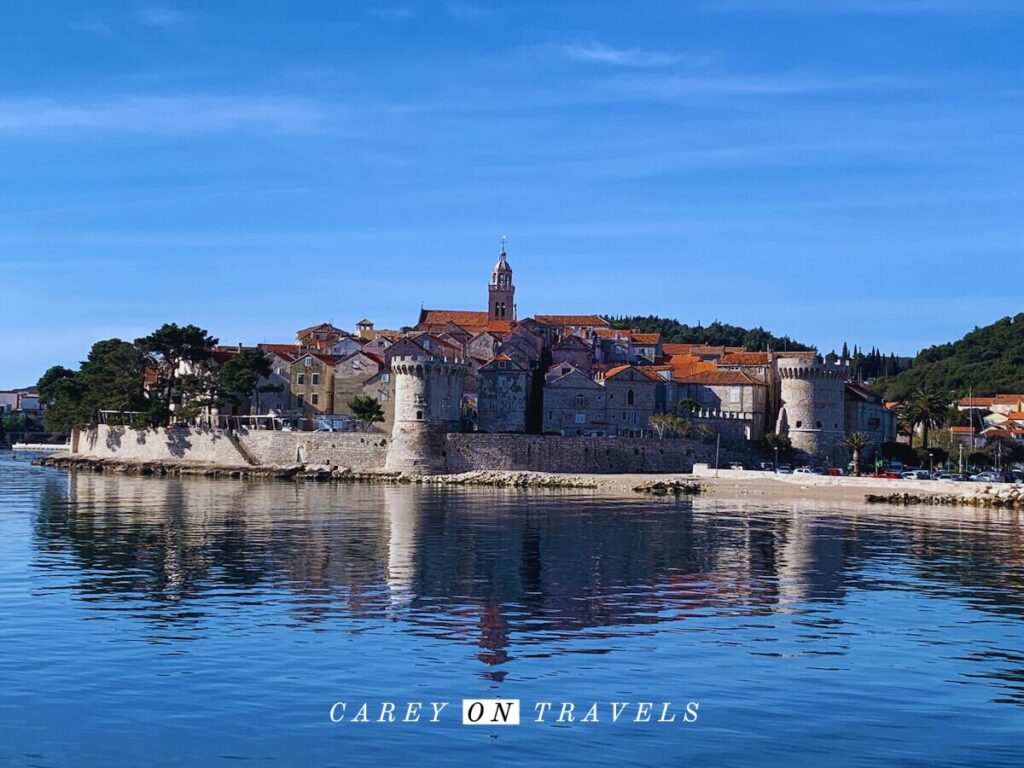
3. Seek Out Hidden Gems and Off-the-Beaten-Path Sites
Europe is filled with hidden gems just waiting to be discovered, often providing richer and more authentic experiences than the usual tourist trails. Dive into local blogs, ask locals for recommendations, or look for guides highlighting off-the-beaten-path or lesser-known attractions. You’ll find quaint villages, under-the-radar museums and scenic nature spots, often without the massive crowds. Plus, exploring these areas often means your tourist dollars are supporting smaller communities that can truly benefit from your visit.
For more ideas and examples of off the beaten path itineraries in Europe:
- Two Days in Split: Hidden Gems away from the Crowds
- How to Plan Your Week in Western Sicily Away from the Crowds
- Top 16 Day Trips from Porto Portugal
- Top 10 Activities in Lisbon Off the Beaten Path
- 10 Activities in Sintra Off the Beaten Path
- Top 10 Cascais, Portugal Hidden Gems
- Azenhas do Mar: Is it Worth Visiting This Hidden Gem?

4. Choose Independent or Small Group Tours
Large tour groups, especially those with 25 or more people, can often be the focus of local frustrations in overtouristed areas. To travel more sustainably and avoid contributing to this issue, consider exploring independently or opting for personalized, small group tours. These tours not only provide a more intimate and engaging experience but also allow you to connect more deeply with local guides who can share their personal insights and stories. Supporting small, locally-run tour companies helps keep the economic benefits within the community, ensuring your visit has a positive impact.
A great example is a recent small group bike tour in Tenerife, biking from Teide National Park. Unlike the large tour groups, we had a chance to get to know Teide National Park, our fellow participants (7 total, from the US, Romania, and Switzerland) and our local guide. We learned a lot about the microclimates of Tenerife, had a customized winery tour and tasting, and generally had a great time with little negative impact on our destination. Getyourguide and Viator are both great resources not only for finding small group tours, but also for checking reviews about the experience, service quality, and sustainability.

5. Prioritize Sustainable Accommodations and Transportation
Your choice of accommodations and transportation can greatly influence your travel footprint. One of our top tips for responsible travel in Europe is to look for hotels, guesthouses, or rentals that prioritize sustainability through eco-friendly practices like energy conservation, waste reduction, and support for local communities. If you are reserving your accommodations on Booking.com, look for the sustainability certification when searching properties.
For transportation, opt for trains, buses, or even cycling and walking between and within cities when feasible, as these options tend to have a lower carbon footprint compared to flying or driving a car. Embracing these sustainable travel choices not only helps protect the environment but also enriches your overall experience, allowing you to see Europe at a slower, more immersive pace.
If you do choose to fly, packing light is the best way to reduce your carbon footprint. Consider travel friendly clothes that are light and compact for packing (such as these recommendations on Best Travel Clothes for Women).

6. Recycle, Use Reusable Water Bottles, and Pick Up Litter
Small actions can make a big difference in keeping the destinations you visit clean and beautiful. Bring a reusable water bottle to reduce plastic waste, and take advantage of Europe’s widespread public recycling bins. Be mindful of your waste—dispose of it properly and recycle whenever possible. Additionally, consider taking the extra step of picking up litter you come across during your travels. We’ve been amazed what we find just off the shoreline when swimming or on the trail when hiking. On a recent early morning hike in Montenegro, we found half eaten ice cream cups littering the trail, just steps away from a trash can.
Leaving places in better shape than when you arrived not only shows respect for the environment but also sets a positive example for other travelers. By adopting these simple habits, you contribute to the preservation of Europe’s natural and urban landscapes, ensuring they remain pristine for everyone to enjoy.
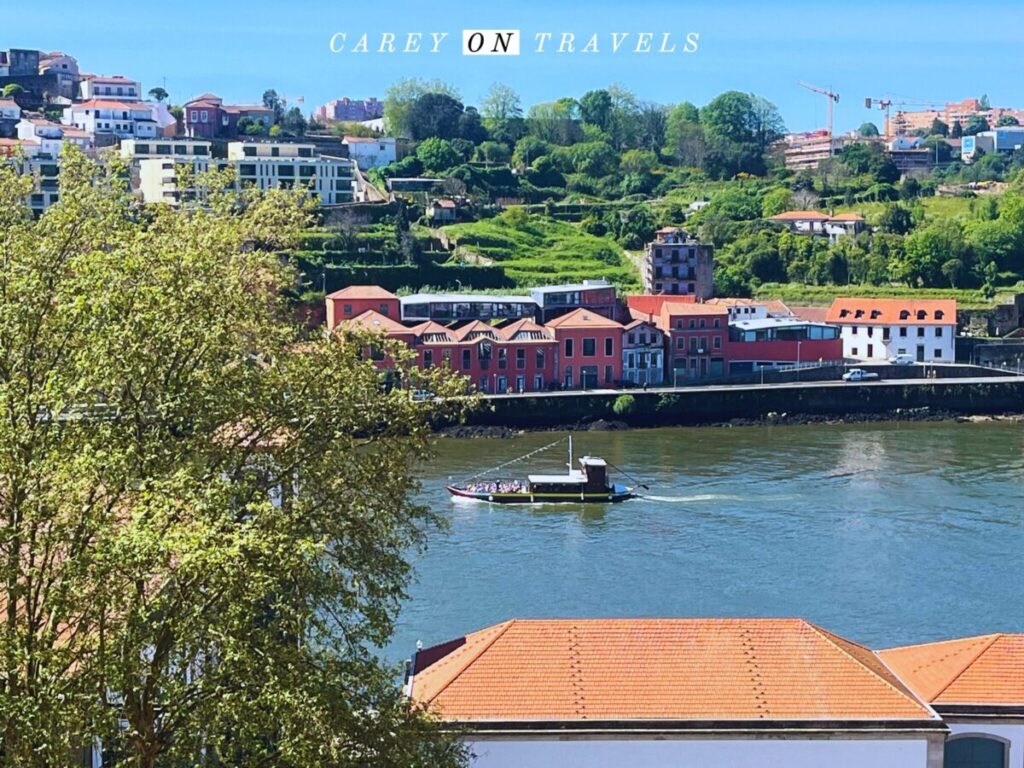
7. Behave Responsibly and Respect Local Norms
It should go without saying, but responsible behavior is crucial when traveling. Loud and obnoxious behavior, especially late at night, can disturb local residents and contribute to a negative image of tourists. On a recent trip in Korčula, we stayed right in old town. A group of tourists were singing loudly at 11-12 pm on a Sunday night and were playing some sort of a game running through the narrow streets of the old town. This leaves such a negative image of tourists as a whole, and truly interrupts the daily lives of the locals. Be mindful of your noise levels, especially in residential areas, and respect local customs and regulations.
Acts of vandalism, such as defacing sculptures or other public art, are not only illegal but deeply disrespectful to the cultural heritage of the places you’re visiting. Always treat the sites, landmarks, and communities you explore with the utmost respect, leaving them as you found them—or better.
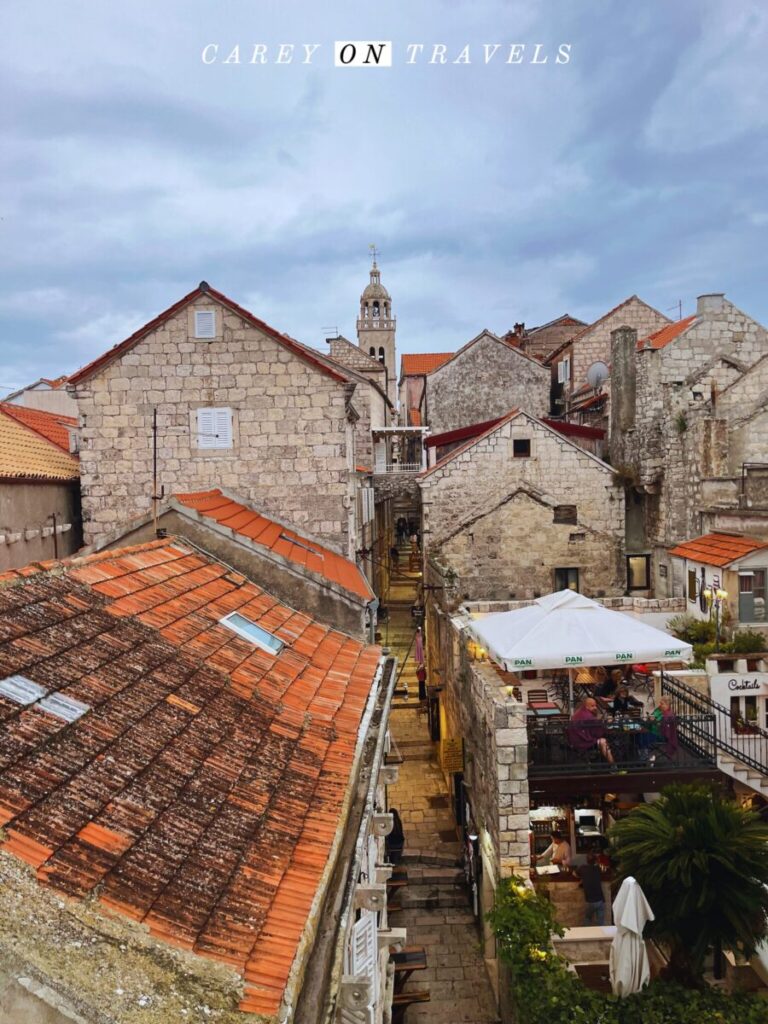
Responsible European Travel Wrap-Up
By incorporating these responsible European travel tips into your travel plans, you can enjoy a more fulfilling European adventure that respects local cultures and contributes positively to the destinations you visit. Traveling responsibly is not just about reducing your impact; it’s about enriching your journey and helping to preserve these beloved locations for future generations. Safe travels and happy exploring!
If you enjoyed this post, pin it for later!
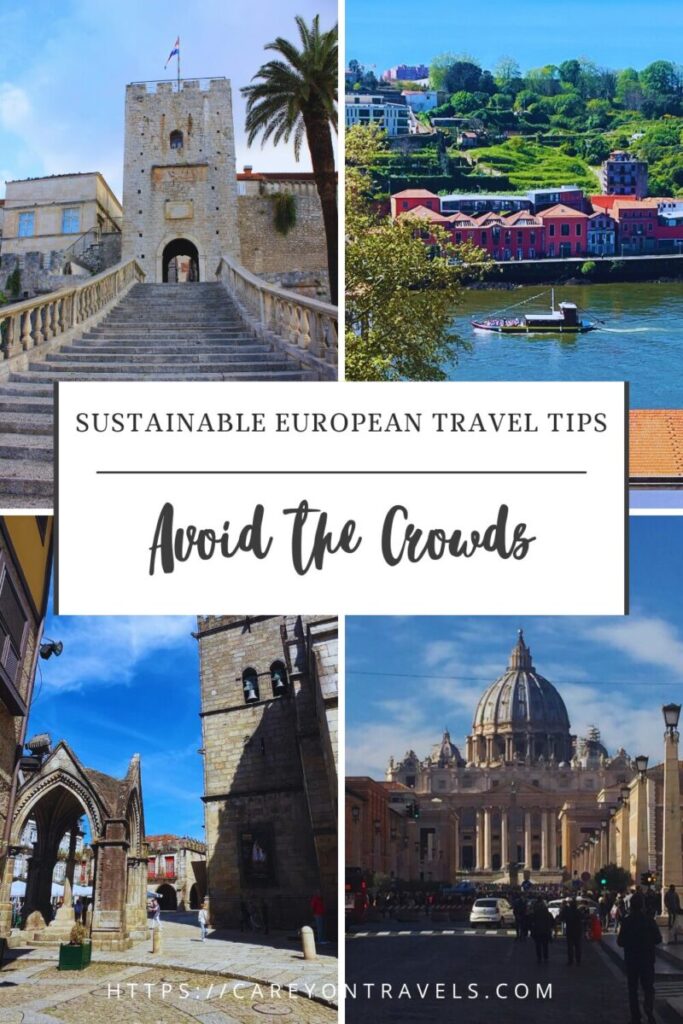
Travel Resources
We recommend booking through our preferred travel booking sites below.
| Air Travel | SkyScanner |
| Lodging | Booking.com, VRBO.com, Expedia.com, Hostelworld |
| Tours and Activities | Viator.com, GetYourGuide.com, TakeWalks.com |
| Car rentals | Discovercars.com |
| Travel insurance | Squaremouth |
| Bike and scooter rentals | BikeBookings.com |
| Train tickets | Trainline, RailEurope |
| Bus tickets | Flixbus, Busbud |





First time visitors to Europe usually follow the well-worn tourist paths but once you have seen those, then it is wonderful to travel off-season and to places off the beaten paths. Great advice.
Thanks for the feedback! We’ve shifted almost fully to off-season travel.
[…] tourist crowds. Visiting touristic cities such as Venice and Rome in the off-season is one of the responsible ways to travel in Europe. Here’s why off-season in Venice, from Fall through early Spring, offers visitors with an […]
Thank you for choosing this topic to write about, it’s so important to be mindful when we are in a new destination and to respect the place and it’s people. Only then can we travel truly immersively and sustainably.
Thats great information, great for Europe travel but for anywhere in the world. BYTW I love your picture of the street of Croatia. Those narrow streets are wonderful.
Thank you! I took the picture from on top of one of the city wall towers in Korcula. If you’re ever there, try out the Cocktail bar Massimo for a fun spot to have a drink with incredible views.
Great tips! If more people would do a few small things to travel more responsibly I think it would have great impacts and benefits.
Thanks for the feedback!
These are great tips! I love visiting in shoulder season but didn’t think of it as a sustainable tip – but you’re right! It helps with overtourism, helps sustain businesses during their less busy times. Sustainability isn’t always about going green, but respecting the place once we get there.
These are great tips! I can understand why locals can get frustrated with tourists. I sometimes get frustrated by tourists as a tourist myself!
I have to admit I get frustrated with tourists too at times
Such an important issue these days, with so many more people travelling than ever before. Shoulder season is a lovely time to travel. Respecting the locals and their customs is a must.
It has gotten so crowded that traveling high season, unless it’s too a lesser traveled place, really doesn’t allow for a relaxed experience.
I absolutely agree with you that we want to stop flooding the typical tourist places in the summer and transition to shoulder months. I waited to September to do a walking tour in Europe and chose the Baltic states.
The Baltic states in shoulder season sound ideal!
Love these tips! They’re not just sustainable but they even guarantee an exceptional travel experience 🙂
Thanks!
We do prefer to travel off season to get less crowds. The benefit indeed as there are less tourists impacting the locals. Heading off the beaten path has always brought some gems of run. And we much prefer the smaller tour groups than getting on a massive 50 person bus! Lots of good way to travel responsibly.
Thanks!
We are pretty lumbered with overtourism in some scenic places. The village I am in right now has about 600 inhabitants, maybe 80% holiday homes (they can be rented out for much more). As a result, the hospital lacks staff, restaurants lack staff, its self service everywhere. Not really sustainable but the locals are damaging their own community (presuming they are renting the holiday apartments and it’s not absentee landlords). Still incredibly scenic, incredibly depopulated…
What a great post. I’m always happy to travel in the off season, I actually prefer it than places with big crowds. Same goes for some of those smaller less visited locations. Lots of great tips here, especially with overtourism and locals reactions to it in the news recently
Thank you!
[…] the colder months, and would highly recommend it for those who prefer to avoid the crowds and travel responsibly to Europe. Here are seven compelling reasons why you should consider booking your trip to Rome during the […]